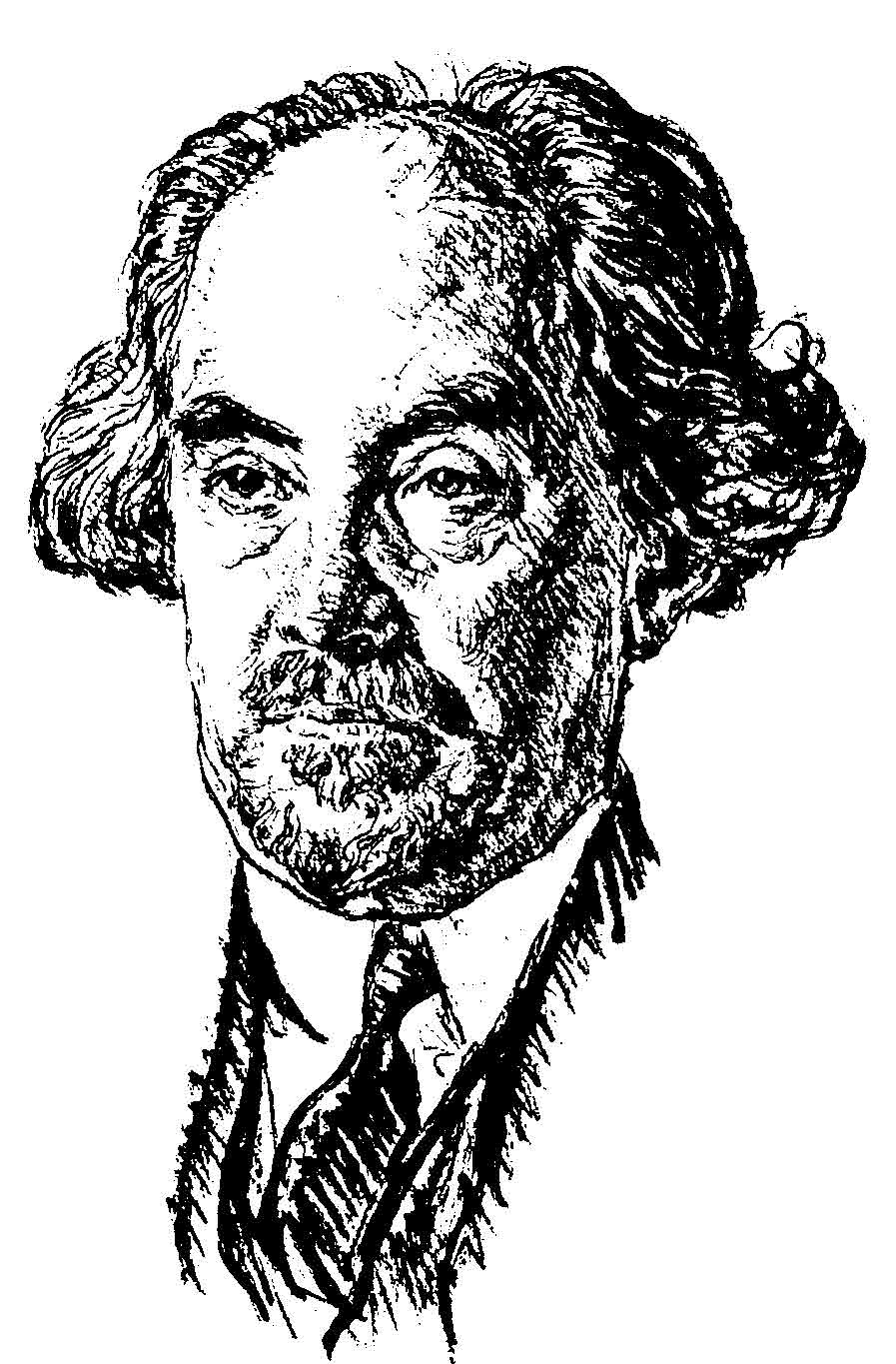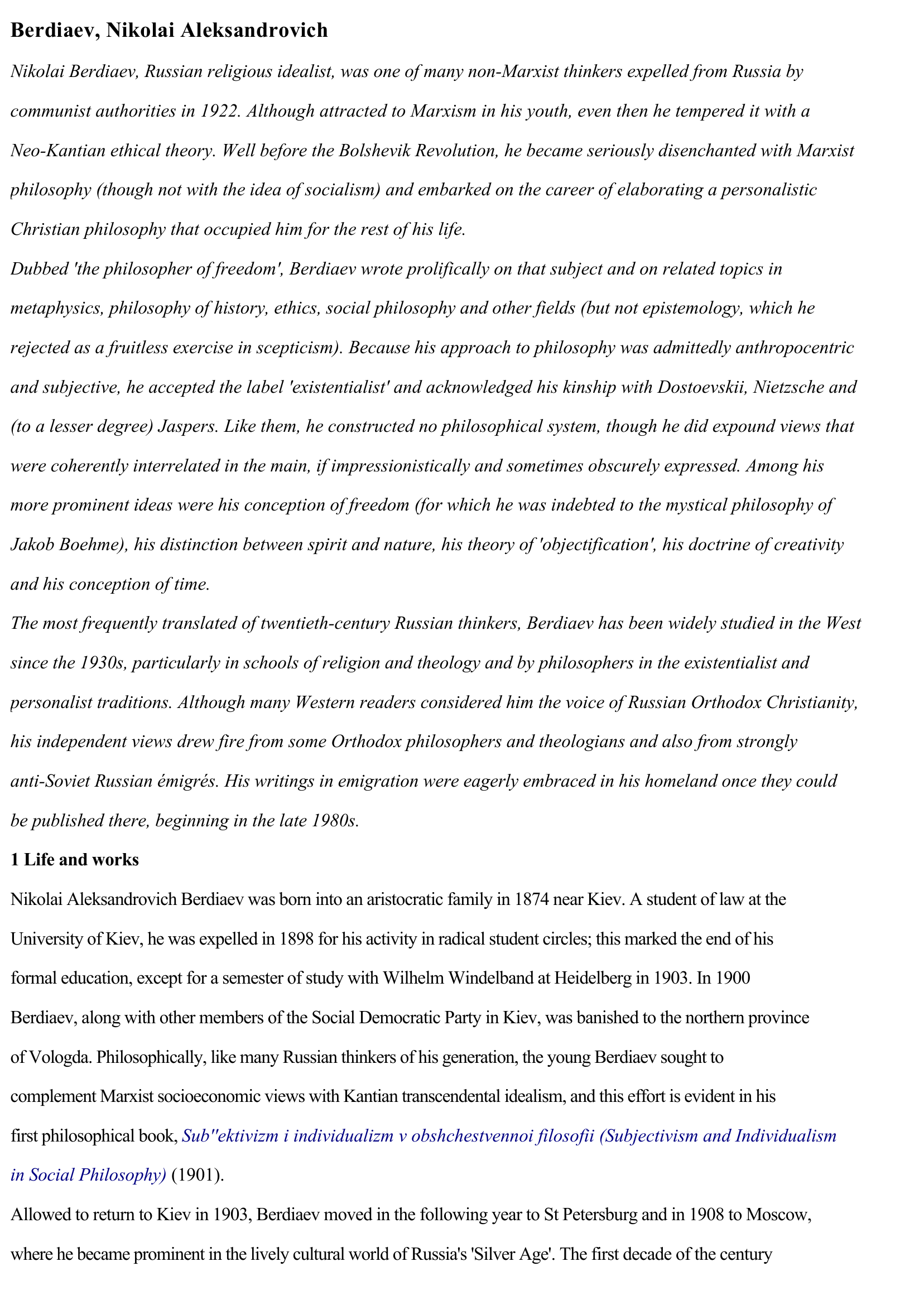DESTINATION DE L'HOMME (DE LA), Essai d’éthique paradoxale, 1931. Nikolaï Alexandrovitch Berdiaev
Publié le 21/09/2018

Extrait du document

La philosophie de Berdiaev est eschatolo-gique, c’est-à-dire qu’elle s’inscrit dans la perspective des fins dernières de l’homme et du monde. C’est pourquoi la notion de salut est chez lui essentielle, ainsi que celle de rédemption. Berdiaev conçoit trois types de temps: le temps cosmique, le temps historique et le temps existentiel, qui est celui de la subjectivité et de l’intériorité humaines. Ces trois temps tendent chacun vers l’éternité, qui est la fin du temps.

«
Berdiaev, Nikolai Aleksandrovich
Nikolai Berdiaev, Russian religious idealist, was one of many non-Marxist thinkers expelled from Russia by
communist authorities in 1922.
Although attracted to Marxism in his youth, even then he tempered it with a
Neo-Kantian ethical theory.
Well before the Bolshevik Revolution, he became seriously disenchanted with Marxist
philosophy (though not with the idea of socialism) and embarked on the career of elaborating a personalistic
Christian philosophy that occupied him for the rest of his life.
Dubbed 'the philosopher of freedom' , Berdiaev wrote prolifically on that subject and on related topics in
metaphysics, philosophy of history, ethics, social philosophy and other fields (but not epistemology, which he
rejected as a fruitless exercise in scepticism).
Because his approach to philosophy was admittedly anthropocentric
and subjective, he accepted the label 'existentialist' and acknowledged his kinship with Dostoevskii, Nietzsche and
(to a lesser degree) Jaspers.
Like them, he constructed no philosophical system, though he did expound views that
were coherently interrelated in the main, if impressionistically and sometimes obscurely expressed.
Among his
more prominent ideas were his conception of freedom (for which he was indebted to the mystical philosophy of
Jakob Boehme), his distinction between spirit and nature, his theory of 'objectification' , his doctrine of creativity
and his conception of time.
The most frequently translated of twentieth-century Russian thinkers, Berdiaev has been widely studied in the West
since the 1930s, particularly in schools of religion and theology and by philosophers in the existentialist and
personalist traditions.
Although many Western readers considered him the voice of Russian Orthodox Christianity,
his independent views drew fire from some Orthodox philosophers and theologians and also from strongly
anti-Soviet Russian émigrés .
His writings in emigration were eagerly embraced in his homeland once they could
be published there, beginning in the late 1980s.
1 Life and works
Nikolai Aleksandrovich Berdiaev was born into an aristocratic family in 1874 near Kiev.
A student of law at the
University of Kiev, he was expelled in 1898 for his activity in radical student circles; this marked the end of his
formal education, except for a semester of study with Wilhelm Windelband at Heidelberg in 1903.
In 1900
Berdiaev, along with other members of the Social Democratic Party in Kiev, was banished to the northern province
of Vologda.
Philosophically, like many Russian thinkers of his generation, the young Berdiaev sought to
complement Marxist socioeconomic views with Kantian transcendental idealism, and this effort is evident in his
first philosophical book, Sub''ektivizm i individualizm v obshchestvennoi filosofii (Subjectivism and Individualism
in Social Philosophy) (1901).
Allowed to return to Kiev in 1903, Berdiaev moved in the following year to St Petersburg and in 1908 to Moscow,
where he became prominent in the lively cultural world of Russia's 'Silver Age' .
The first decade of the century.
»
↓↓↓ APERÇU DU DOCUMENT ↓↓↓
Liens utiles
- SOURCES ET LE SENS DU COMMUNISME RUSSE (LES), Nikolaï Alexandrovitch Berdiaev (ou Berdiaeff)
- ESPRIT ET RÉALITÉ, Nikolaï Alexandrovitch Berdiaev
- DESTINATION DE L'HOMME (résumé & analyse)
- DESTINATION DU SAVANT ET DE L'HOMME DE LETTRES (De la) (résumé & analyse) de Fichte
- DESTINATION DE L’HOMME (LA), Fichte - étude de l'oeuvre






